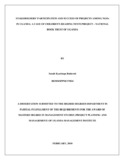| dc.contributor.author | KYARIMPA, Sarah Rubereti | |
| dc.contributor.author | Mugerwa, Ben (Supervisor) | |
| dc.contributor.author | Atwebembeire, Juliet Opondo (Supervisor) | |
| dc.date.accessioned | 2017-06-01T13:59:33Z | |
| dc.date.available | 2017-06-01T13:59:33Z | |
| dc.date.issued | 2010-02 | |
| dc.identifier.citation | APA | en_US |
| dc.identifier.other | 08/MMSPPM/17/024 | |
| dc.identifier.uri | http://hdl.handle.net/20.500.12305/140 | |
| dc.description | A Dissertation Submitted to the Higher Degrees Department in Partial Fulfillment of the Requirements for the Award of Masters Degree in Management Studies (Project Planning and Management) of Uganda Management Institute. | en_US |
| dc.description.abstract | This research sought to assess how stakeholders’ participation contributes to success of projects among NGO’s in Uganda. The general objective of this study was to assess the contribution of stakeholders’ participation to the success of Children’s Reading Tents Project under National Book Trust of Uganda. This project has been in existence since 1997, but its impact has not been felt in regard to promoting the reading culture. Despite NABOTU’s intervention, participation of key stakeholders and their contribution to success of the project had not been assessed. The study involved 85 respondents drawn from pupils, teachers, head teachers, from selected CRT primary schools in Kampala and Mpigi Districts, parents/guardians, CRT Project staff and also representatives of key stakeholder associations. This study was based on a cross-sectional study design with both qualitative and quantitative methods. Data collection techniques used were self-administered questionnaires, interviews, observation with photography, focus group discussions and also documents analysis. Data from key informants’ was analysed qualitatively, transcribed, and grouped into independent and dependent variables. Quantitative data was categorized and analysed using frequency tables, graphs and pie charts for easy interpretation by SPSS programme. From the study, findings revealed that participatory project implementation had the strongest relationship with success of the project. It was found out that much as most of the stakeholders were involved at implementation level, this alone would not lead to success of the project. At planning level, views of many of the stakeholders were not incorporated and the project design did not clearly bring out links to outsiders and limited some in number. The study recommended that NABOTU should develop appropriate strategies to involve most of the stakeholders from project planning level to project close out. | en_US |
| dc.language.iso | en | en_US |
| dc.publisher | Uganda Management Institute | en_US |
| dc.subject | Children’s Reading Tents Project | en_US |
| dc.subject | Stakeholders’ Participation | en_US |
| dc.subject | Ngos | en_US |
| dc.subject | National Book Trust of Uganda | en_US |
| dc.subject | Projects | en_US |
| dc.title | Stakeholders’ Participation and Success of Projects among Ngos in Uganda: A Case of Children’s Reading Tents Project – National Book Trust of Uganda | en_US |
| dc.type | Thesis | en_US |

